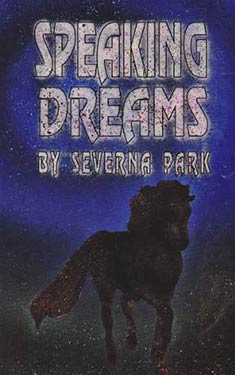Severna Park
Completed 5/29/2020,
Reviewed 5/29/2020
4 stars
Maybe I’m
becoming a softy, but I really liked this lesbian space opera about a galactic
empire, evil slavers, and vicious aliens.
I thought it was well-written even though the pacing was uneven. The plot was surprisingly exciting. I was especially gripped by the whole concept
of a slaver race keeping planets of humans as breeding grounds for their
slavery industry. It was horrifying and
emotionally pretty gut-wrenching. This
book was nominated for a Lambda Literary Award for Lesbian Sci Fi/Fantasy in
1993.
Costa is a
young woman on a planet which Sector, the enslaving race, uses to breed
slaves. Costa is destined to marry and
bear lots of children. But she has several
secrets. First, she likes women. Second, she has dreams that give her detailed
events of the near future, usually, the events of the next day. She uses the information from these dreams to
try to thwart the Sector. The problem
is, she usually doesn’t think the actions through and causes more harm than
good. Eventually, her actions get her
into serious trouble and instead of bearing children, she is made a slave.
Two years
later, Mira LoDire, a diplomat for the Emirate that controls a large part of
the galaxy, buys Costa. Mira is against
slavery, but is ordered to buy one by her superior officer so as to be taken
seriously in upcoming negotiations with Sector.
Costa is nearly despondent from the abuse she’s received as a
slave. It takes her a while to heal
emotionally. At the same time, an alien
race of bloodthirsty insect-like aliens is threatening the Emirate. Because of her past on her slave planet and
her dreams, Costa and Mira become entangled in a dangerous powerplay between
Sector and the Emirate.
I really
liked Mira. She’s a down to earth woman who
buys Costa because she wants to save and protect her, not because she’d made a
good slave. At first, Mira’s dismissive
of Costa’s prescient abilities as it is not known that slaves are bred with any
psychic powers. But she eventually comes
around as the dreams turn into reality.
Her transition from doubter to believer is done well. Costa was harder to warm up to. Even though the book begins with her, I got
frustrated with how she didn’t seem to learn from her mistakes when acting out
on her dreams. That development took a
long time, but when it did, it made her much more likable.
Of course,
Mira and Costa fall in love. At first, I
was a little uneasy with it. I wondered
if it was akin to Stockholm Syndrome.
But it wasn’t that at all, and their relationship developed well. And together with the excitement of the book,
it became a romance I found myself cheering for. It’s not a romantic novel with science
fiction. It has what I thought was an
appropriate amount for any novel.
As I noted
above, I thought the whole way the author dealt with slavery was done really
well. I thought the whole concept of a
future that had regressed to a slavery economy was well done. I had such empathy for the enslaved. It was easy to hate the slavers. They were out and out evil. Maybe too inhuman. The book is told third person from Mira and
Costa’s point of view, so we never know what makes the slavers tick. But I was cheering so hard for them, I didn’t
really care about the slavers.
I give the
book four stars out of five. Despite
having a pretty good emotional response to it, I thought the book was a little
flawed. Some of the science is not
described well. A hardcore science
fiction fan may take issues with some of it, like the instantaneous
interstellar communication. And there
were times when the book really dragged.
But in general, the writing is good, the dialogue is smart, the plot is
enjoyable, and the suspense engrossing.

No comments:
Post a Comment